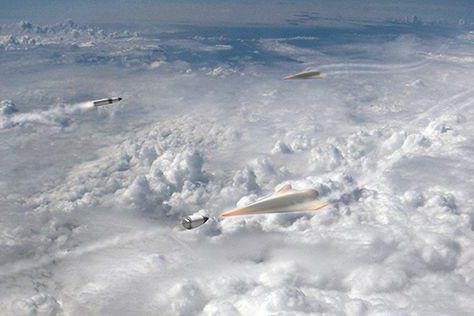Aerojet Rocketdyne has been awarded a DARPA contract to counter hypersonic missiles. Photo courtesy of DARPA
Feb. 11 (UPI) -- Aerojet Rocketdyne has been awarded a $12.1 million contract -- which could be worth up to $19.6 million -- by the Defense Research Projects Agency for its Glide Breaker program.
The contract, announced Monday by Aerojet and the Department of Defense, continues work on the program, which started in 2018 to develop technologies to defense against hypersonic systems.
"Advancing hypersonic technology is a national security imperative," Eileen Drake, Aerojet Rocketdyne CEO and president said in a press release. "Our team is proud to apply our decades of experience developing hypersonic and missile propulsion technologies to the Glide Breaker program."
The Glide Breaker system aims to intercept and engage hypersonic threats in the upper atmosphere.
In December, Russian officials announced that the country's first hypersonic ballistic missiles had been put into service -- and that, because they can travel at the speed of sound, they should be invulnerable to U.S. defense systems.
That announcement came two months after a U.S. Army announcement that the U.S. expects to deploy a long-range hypersonic missile system by 2023.
Aerojet supplies solid-fueled and air-breathing propulsion systems for hypersonic flight and provided systems for a joint Air Force-DARPA-NASA project that completed the first hypersonic flight of a hydrocarbon-fueled and -cooled vehicle.
The contractor more recently completed a set of subscale propulsion-system test firings as part of a DARPA program to develop a ground-launched hypersonic missile.
This project has an expected completion date of February 2021.
Just under half the work on the contract will be performed in Huntsville, Ala., with other work taking place in Sacramento, Calif., Orange, Va., Healdsburg, Calif., and Sunnyvale, Calif.
Fiscal 2019 research, development, testing and evaluation funds for the full amount of the contract are obligated at the time of the award.















